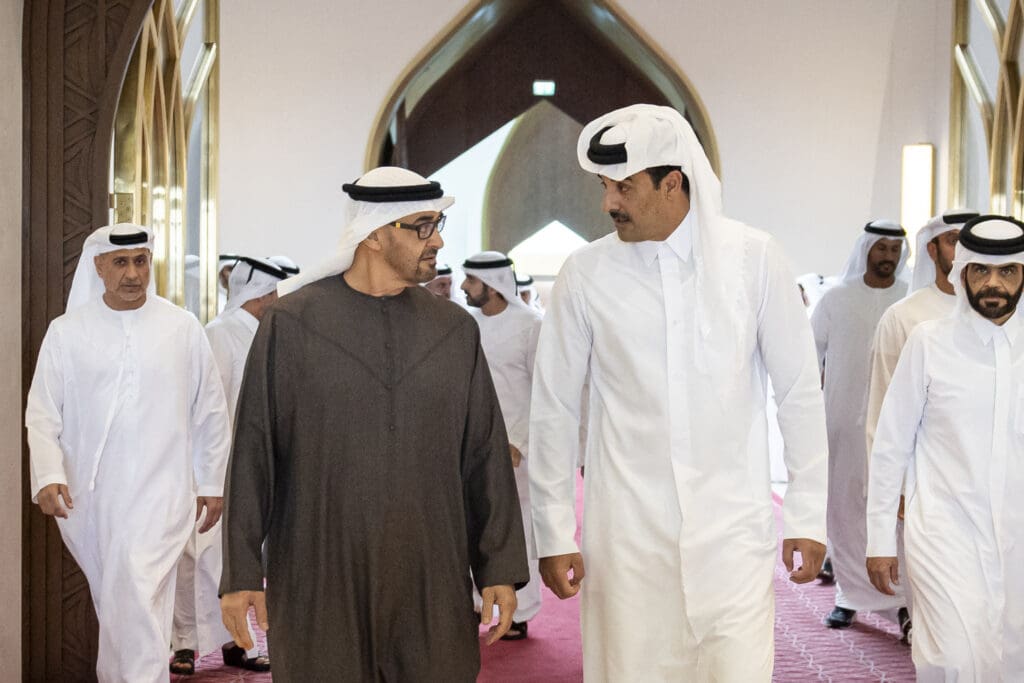Iran’s ballistic missile attack on the Qatari airbase at Al Udeid was viewed by many international analysts and media strictly through the lens of the confrontation between the U.S., Israel and Iran. Widely seen as a symbolic move, the attack’s lack of casualties allowed U.S. President Donald Trump to pursue his preferred option of de-escalation after America’s massive strike on Iranian nuclear facilities and avoiding a wider confrontation involving the U.S military.
Yet for Qatar and the broader Arab Gulf region, the unprecedented nature and seriousness of the attack shattered any notion that diplomacy and good relations were enough to protect the sovereignty and safety of the Gulf Cooperation Council members. The attack on Al Udeid represents the first state-to-state military action in the Gulf since Iraq’s 1990 invasion of Kuwait, marking a dangerous turn in Gulf security that realigns Qatar’s threat perceptions and reaffirms those of other states in the GCC. Moving forward, it should prompt a greater regional security integration that leads to a credible and formidable defensive capability.
The Attack and its Implications
At 7:35 PM on June 23, Qataris witnessed something they never imagined seeing in their lifetimes: the sky over their small coastal country lit up with interceptor missiles. This was not a drill, Qatar—long considered one of the safest places in the region—was under attack.
Residents had anticipated something might happen after receiving word that Qatar’s airspace would be temporarily closed in the hours proceeding the event, but no one thought the threat would materialize so vividly. After initial concern for the safety of families who were going about their daily lives, thoughts turned to the broader regional and global repercussions. That night, the Islamic Revolutionary Guard Corps (IRGC) attacked Qatari soil.
To be clear: This was an Iranian assault on a Qatari military base (while it is widely believed to be an American base, this is a misconception). The strike—which involved ballistic missiles more sophisticated than those used during previous “symbolic” Iranian retaliations, like on the 2020 Ain al Assad base in Iraq—should be seen as intended to do damage and was intercepted by the Qatari Armed Forces with support from the United States. Yet, much of the international reportage glossed over or ignored these facts, with total disregard for the seriousness of the attack.
Qatari residents were informed by several officials that the Iranian operation was a surprise and only confirmed through intelligence. Defending it involved hundreds of Qatari servicemen, spread across multiple air defense sites in the country; and the end, this resulted in the largest combat use of the Patriot system in history.
To no one’s surprise, the incident created room for diplomatic maneuvering. U.S. President Donald Trump seized on the opportunity to push for a temporary halt in hostilities between Iran and Israel. The incident also revealed a deepening schism between Iranian diplomatic and military circles. The IRGC seems to be driving key decisions, an alarming development, especially given the far-reaching diplomatic consequences and realignments this attack will likely trigger. Strategically, the move appears intended more for domestic consumption than external impact—a face-saving exercise framed for the Iranian public. The controlled media response in Iran hours after the attack reinforces this view.
The Qatari Calculus
While these dynamics are worth examining, it is equally important to articulate a distinctly Qatari perspective.
Qatar has long maintained a pragmatic relationship with Iran, rooted in shared management of the South Pars/North natural gas field—the cornerstone of Qatar’s economic success. But the relationship is also based on an historically low perception of Iran as a military threat. That calculus changed dramatically on June 23.
Fortunately, the physical damage to Al Udeid—and areas where debris fell—was limited, thanks to the focused nature of Iranian targeting and the effectiveness of Qatar’s air defense systems. Yet the strategic impact was significant. Public opinion in Qatar has hardened, and policymakers now have little choice but to reassess Iran as a security threat. There is also a noticeable shift toward greater alignment within the Gulf Cooperation Council (GCC), as illustrated by the Emirati president’s swift visit to Doha after the attack.
Predicting what comes next is difficult. Qatar issued a strongly worded message to Iran about the unacceptability of its action and the breach of Qatari sovereignty, but has chosen not to escalate—opting instead for a diplomatic and calculated approach.
From a defense perspective, the events of that night showed how far Qatar defense capabilities have come. The Qatari Armed Forces detected the attack early, cleared the airspace, and intercepted all seven ballistic missiles of the first wave, shot from afar, over the sea. And of the 12 ballistic missiles launched during the second wave, 11 were intercepted, with one hitting the base without causing human or material losses. This success reflects nearly a decade of military modernization. Had this attack occurred ten years ago, the outcome would have been far worse.
Qatar had the means to retaliate and could have inflicted significant damage, especially following Israel’s concurrent strikes on Iranian command-and-control nodes, radar systems and air defenses. But Doha chose restraint. That decision may not satisfy all audiences, but it was arguably the right one for regional stability, at least for now.
The Iranian attack should also prompt a reassessment of how Qatar assigns its threat perception. Iran’s decision-making process appears increasingly erratic and detached from rational statecraft. The attack demonstrates that intent and behavior must drive threat assessments, especially in the current strategic environment.
Air defense proved decisive, this reinforces what many Gulf and U.S. officials have advocated for years: the urgent need for a GCC-integrated air and missile defense system. What was once a policy proposal should now be an imperative.
Finally, this incident underscores the importance of building a Gulf-centered regional security architecture. Unlike the hyper-securitized posture of Israel, in which it is willing to destroy entire societies like Gaza and display utter disregard for international laws and norms, or Iran’s ideological adventurism that results in such miscalculations, in recent years the Gulf states have prioritized their economic and social development. This pragmatic outlook is stabilizing, but it requires credible defense capabilities. That includes revitalizing the Peninsula Shield Force—the military arm of the GCC—investing in joint training, developing shared doctrines and enhancing interoperability through common tactics, techniques and procedures (TTPs).
There is room for cautious optimism. The recent GCC security vision document, which covers security objectives and principles—the first since the Joint Defense Agreement of 2000—is a welcome step. But implementation will be key, given such efforts have proven difficult and complicated in the past.
The years ahead will be perilous for the Gulf. The only sustainable path forward lies in deeper cooperation, real integration, and not just a shared vision for collective security but actual solid next steps into developing a credible, capable and potent joint security-defense capability.


